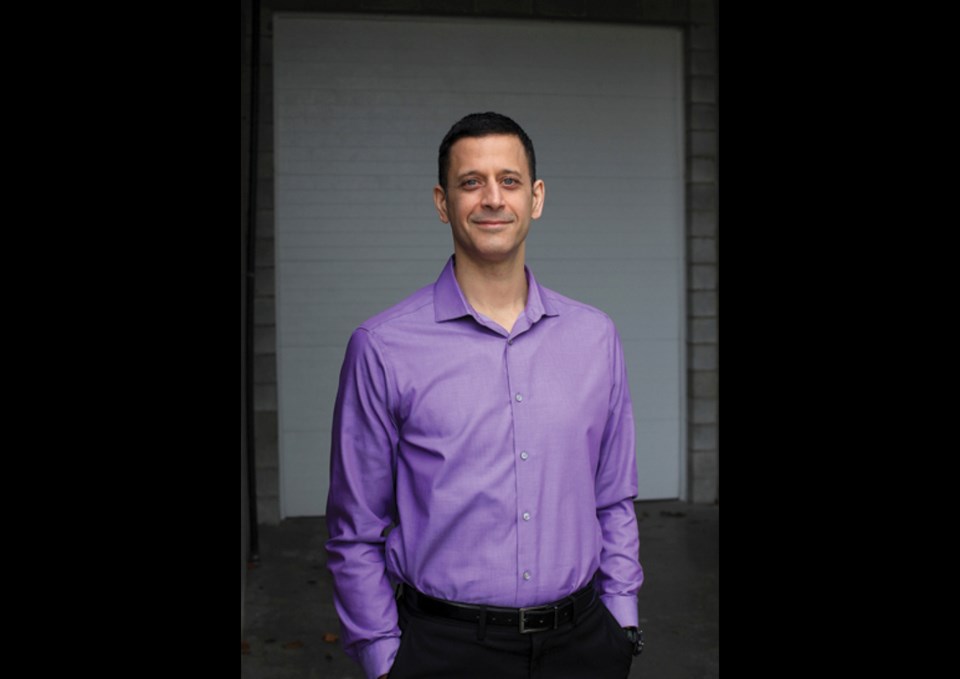It started with stomach pain.
That pain worsened, Kasim Al-Mashat recalls.
Discussing that pain in a warehouse – empty except for Al-Mashat, his wife, the interviewer, and a life-sized-Halloween prop that looks oddly human when glimpsed from the corner of the eye – Al-Mashat speaks calmly and softly even when recalling his physical breakdown.
He had colitis, he says, and there seemed to be no solution in sight.
With the pain becoming unbearable, Al-Mashat sought “complementary medicine.”
At first, that just meant trying meditation.
There’s a perception that highly effective people don’t meditate, Al-Mashat says. It’s a perception he knows well, having once held it.
But the Handsworth grad took to meditation almost instantly. He practised and practised again, took a retreat and eventually dropped everything else in his life to spend six months at a forest meditation centre in southeast Asia.
Each day started in the middle of the night, at about 3 a.m. Al-Mashat would be roused from a too-brief sleep, eat, and meditate.
There was no phone and no Internet access and no books, either. There weren’t weekends, holidays, or any days off.
“Just meditating,” he recalls. “It was intense.”
Every day he lived by the same schedule, taking the day’s last meal at 10:30 a.m.
Asked if he wanted to leave, he nods.
“A lot.”
But he resisted leaving, feeling there was still more for him to learn.
“I went through deep valleys of agony, defeat, pain; physical and emotional, and I had to be present.”
He also felt that he was learning something about himself and about pain and suffering; and that while pain might be inevitable, suffering is often self-inflicted.
“I got to know me on a deeper level. It’s still me,” he says, explaining he has fewer “layers on the mind.”
Besides feeling easier in the stomach, the experience also made him attuned to his own behaviour.
“What am I doing? Why am I doing it?”
Asked where in southeast Asia the centre was, Al-Mashat demurs.
“I want people to have their own journey and not assume that they need to go where I went to get a profound experience,” he explains.
And while his own experience was profound, Al-Mashat explains he’s not happy all the time. However, he’s less prone to fall into those introspective periods of rumination that are often a precursor to depression.
Part of mindfulness is not living in the past or the future but rather paying attention to the moment, doing it purposefully and without judgement.
“Where our mind goes to is relevant because it affects our health,” he says.
Mindfulness isn’t a New-Age thing, Al-Mashat says, explaining that the technique is based on: “thousands of years of wisdom traditions.”
On the fourth Monday of each month Al-Mashat holds a free laughter yoga class. The next session is set for 6 p.m. Monday, Feb. 26 at 3743 Delbrook Ave.
“The first time I tried it I thought: this is weird,” he says.
However, laughter yoga has been effective in assuaging depression in elderly women in India. Other studies have shown the practice has been helpful in easing anxiety, according to studies published by the United States National Library of Medicine.
It’s a technique Al-Mashat says he’s warmed to.
“I take my psychologist hat off and put a goofy hat on.”
It’s a way to nurture childlike playfulness, he explains.
“We’re very self-critical, which keeps us from experiencing joy.”
With a background in business, Al-Mashat did sales work for Telus and UPS, he says. He was planning to pursue an MBA when a stretch as a volunteer at the Harvest Project changed his priorities.
“I thought, ‘that’s what I want to be doing, working with people, making a difference.’”
He went back to school, eventually becoming a registered psychologist. He also studied mindfulness based stress reduction at the University of Massachusetts Medical School’s Center for Mindfulness.
Al-Mashat notes that there was a time when exercise was treated skeptically. Henry Ford famously dubbed exercise “bunk,” saying: “If you are healthy you don’t need it. If you are sick you shouldn’t take it.”
The need for exercise is now widely accepted.
A similar evolution is necessary for mindfulness, Al-Mashat says, noting the impact stress, anxiety and depression can have on the workplace in terms of absenteeism, turnover and sick leave.
Mental illness takes a toll on the economy that can be measured in the billions, according to the Mental Health Commission of Canada.
While there are institutional changes to be made, it’s also a problem that can be addressed by individuals from moment to moment.
“How we meet those moments really impacts the quality of our lives, whether it is a painful moment or wonderful one.”
Al-Mashat’s next free information session on mindfulness is scheduled for March 15 at 7 p.m. Registration is required.



